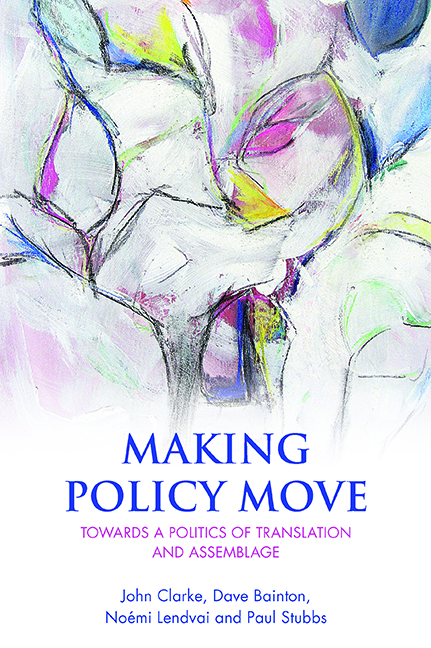Book contents
- Frontmatter
- Contents
- Introduction
- One Moving policy studies
- Two Translation, assemblage and beyond: towards a conceptual repertoire
- Three Performing reform in South East Europe: consultancy, translation and flexible agency
- Four The managerialised university: translating and assembling the right to manage
- Five Soft governance, policy fictions and translation zones: European policy spaces and their making
- Six Translating education: assembling ways of knowing otherwise
- Seven ‘Policy otherwise’: towards an ethics and politics of policy translation
- References
- Index
Six - Translating education: assembling ways of knowing otherwise
Published online by Cambridge University Press: 07 March 2022
- Frontmatter
- Contents
- Introduction
- One Moving policy studies
- Two Translation, assemblage and beyond: towards a conceptual repertoire
- Three Performing reform in South East Europe: consultancy, translation and flexible agency
- Four The managerialised university: translating and assembling the right to manage
- Five Soft governance, policy fictions and translation zones: European policy spaces and their making
- Six Translating education: assembling ways of knowing otherwise
- Seven ‘Policy otherwise’: towards an ethics and politics of policy translation
- References
- Index
Summary
Introduction
This chapter explores puzzles around ‘translation’, ‘global educational agendas’ and ‘policy transfers’ through a dialogue between theoretical considerations on translation and policy transfer, with ethnographic work carried out in rural communities in Ladakh, India. In an attempt to offer a critical voice to processes of global epistemic reorganisation, ‘translation’ is used as an approach that has the potential to break out of the straitjacket of the disciplinary boundaries of policy studies, thereby contributing to a new way of imagining what policy might be (Yanow, 2011). Translation, I argue, by being sensitive to mechanisms of silencing and social rupture that accompany such transnational transfers, makes visible how global policy reassembles the social.
However, as I ultimately go on to argue, a translation approach offers not only a way to analyse hegemonic dimensions and articulations of global policy transfer processes, but also a way to expand counter-hegemonic possibilities. This demands an enriched conceptualisation of translation as far more than a fragile linguistic and conceptual process in which ‘unintended consequences’ can be attributed to how the original authentic (Western) policy may have been ‘lost in translation’. Rather, policy translation is more critically, and more positively, understood as an active, creative process that has the potential to bring new educational worlds into being.
From policy transfer to policy translation
Globalisation has been associated with the emergence of a ‘global policy space’ – a space that has increasingly become crowded with a growing number of policy domains subjected to global policy production. This process of privileging the global as a scale for ‘policy’ has hugely expanded the scope and range of policies pursued by international organisations, such as the United Nations (UN), the World Bank or the International Monetary Fund (IMF) (Best, 2012). Among the many reasons contributing to this expansion and accumulation is the currency and logic of ‘policy transfer’, which Diane Stone (2002: 5) defines as the ‘emulation or synthesis of policies, institutions, ideologies and ideas across time, place or policy domains’. Within this rationale, policies, institutions and ideas are seen as immensely mobile and moveable from one context to another, insofar as they are understood to be universally applicable in their international ‘diffusion’.
- Type
- Chapter
- Information
- Making Policy MoveTowards a Politics of Translation and Assemblage, pp. 157 - 186Publisher: Bristol University PressPrint publication year: 2015



